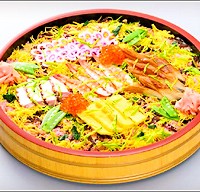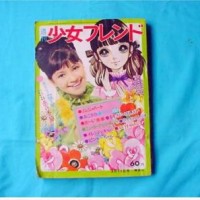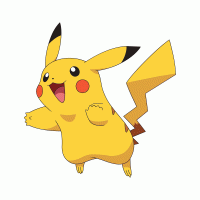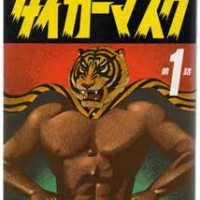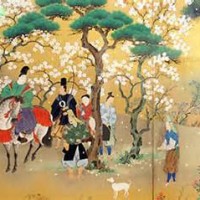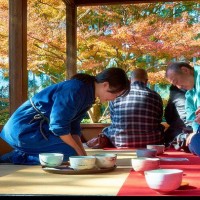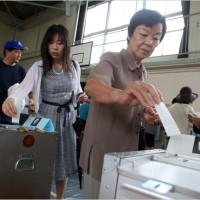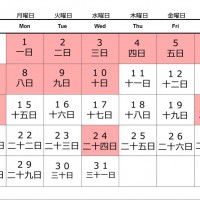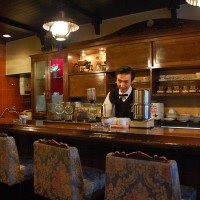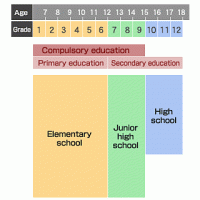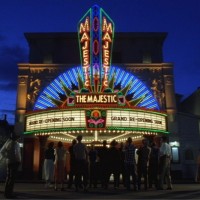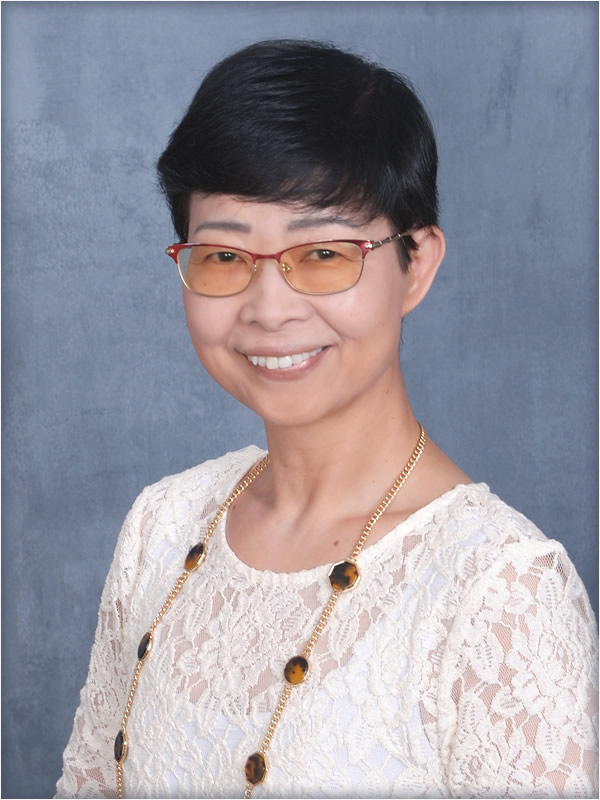blog
Thursday: Japanese Food
08/14/2015 blog
Chirashizushi/Barazushi (Home Made Chirashizushi for A Family and Guests) (Chirashizushi Served in an Individual Bowl at the Sushi Bar) Quite a while ago, Gomokuzushi (one kind of “Sushi”) was discussed in my blog. This is another kind of “Sushi.” The name of the cuisine which includes the word, “Sushi,” the rice is “vinegared.” This is one huge difference between OOO Don(buri) and XXX Sushi (or “-zushi” in one word). Sushi’s “Su” means “vinegar.” OOOdon (Donburi) use regular rice, NOT vinegared. Well, “Chirashizushi” include the word, “chirashi,” whose verb form is “chirasu (= scatter).” When you make it at home, you cook rice and mix it with vinegar. That’s the first …
Wednesday: Nihon-no Manga
08/13/2015 blog
Sain-wa V (サインはV) (Started out in weekly “Shojo Furendo” in 1968 – “Friend of Girls”) (Comics Version) Original Manga was not familiar with me because I was not a fan of weekly magazine called “Shojo Furendo” in early 70’s. But its TV show, which started in 1969, grabbed my attention (and entire nation). TV dramas dealing with a Volleyball theme had been created since Japanese women’s volleyball team called “Toyo-no Majo (Witches of the Orient)” won a Gold Medal in Tokyo Olympics in 1964, but “Sain-wa V” and “Attack No.1 (Anime)” enjoyed their top popularity (highest audience rating – 39.3%; average – 32.3%). (“Toyo-no Majo” – …
Wednesday: Nihon-no Manga
08/13/2015 blog
Pokemon* (Picachu) This weirdo appeared in the market in mid 90’s. Immediately after that, its franchise grew up to be “Pokemon Company (https://en.wikipedia.org/wiki/Pok%C3%A9mon). None of you would say, “Don’t know Pokemon!” since you are here at JapaneseExperts.net. I left Japan in late December of the year 1998. By then, they had already established their reputation, and started to enjoy their huge revenue coming only from this franchise. However, they were exposed to public’s severe accusation regarding the special effects they use for the show, including the “beam” Picachu uses all the time. Once I heard the news, saying “Kids watching the show and being exposed to Picachu’s super strong flashing …
Wednesday: Nihon-no Manga
08/13/2015 blog
Taigaa Masuku (Tiger Mask) I have never liked wrestling. Period. Not interested. Go see a professional wrestling match? No way. I’ll pass even if it is free. I can live without wrestling in my life! One day, some new TV show started. This is based on Manga shown above. Who’s the author? Ikki Kajiwara*? Interesting! Give it a shot! And…I was hooked! Kajiwara is very famous for fighting and sports themes – Remember in my previous blog, I picked “Judo Icchokusen?” That was done by Kajiwara, too. Really this guy is really good at the themes. So, “Tiger Mask” TV version was such a tearjerker. Naoto Date (Tiger Mask) …
Tuesday: Nihon-no Kotowaza
08/12/2015 blog
Chinmoku-wa Kin [Vocaburary] Chinmoku: Scilence Kin: Gold [Translation] Scilence is golden. [Comment] Who do you think “most unpopular/unwelcome people” in Japan? Yes, “Chatterbox.” So, this proverb is so very true. Scilence is really appreciated in Japan. In the library, you are supposed to keep quiet. No talk! Nada…. At schools or offices, the quieter, the better. Japanese children are so deciplined that they don’t do anything – just keep your mouth shut – while they are doing a particular thing. “No Multi-Task People Needed” – that’s who the Japanese are!
Tuesday: Nihon-no Kotowaza
08/12/2015 blog
Atsusa Samusa-mo Higan-made (Happens on March 20th and September 22nd) [Vocaburary] Atsusa: Heat Samusa: Cold Higan: Equinox (Vernal and Autumnal) [Translation] No heat or cold lasts over the equinox. [Comment] The Japanese appreciated and embraced the transitions of seasons by saying the expression above, instead of complaining about unexpectedly long-lasting cold (Spring) or heat (Autumn). Since time immemorial, they have had full of wit. It is reported in Japan that Japanese Emperor Akihito has not been using air conditioners in his loyal palace in Tokyo, Japan. Emperor Akihito seems to concerve energy and also to have a wish to embrace the lasting heat with the entire nation this summer. He …
Tuesday: Nihon-no Kotowaza
08/12/2015 blog
Noo Aru Taka-wa Tsume-wo Kakusu In Japan, hawks or falcons have been admired and respected because of their beauty and cleverness. When a hawk is used as an example of something, that something is always “GOOD.” No exception. Still, in this proverb, there are some good ones while others NOT. Those good ones with “brain (No)” tend now to show their strong points like a hawk’s sharp knife-like nails. If they show them to others, especially to their preys, they are ending up in starvation. So, they show up quietly and don’t show their “arms.” [Vocaburary] No: brain Taka: hawks or falcons Tsume: nails Kakusu: hide [Translation] A talented person …
Tuesday: Nihon-no Kotowaza
08/12/2015 blog
Expressions Related to “Baka (Fool)” 1) “Baka-to Hasami-wa Tsukaiyoo(-de Kireru).” [“Praise a fool, and you may make him useful.”] 2) “Baka-ni Tsukeru Kusuri-wa Nai.” [“There is no cure for a fool.”/ “No medicine can cure a fool.”/ “A born fool is never cured.”] 3) “Baka-wa Shinanakya Naoranai.” [“He who is born a fool is never cured.”/ “Born wise, die unwise.”] 4) “Baka-hodo Kowai Mono-wa Nai.” [“A fool may go to any extremes./ “Fools rush in where angels fear to tread.”] 5) “Bakana Ko-hodo Kawaii.” [“An idiot is all the dearer to his parents.”] 6) “Baka-no Hitotsu Oboe.” [“A fool tries to judge eveything by one thing he knows.] 7) “Baka-no …
Monday: One Point Nihongo Clinic
08/11/2015 blog
“Kekkodesu” (Guests are supposed to say, “Kekko-na Otemae-de Gozaimashita.”) (“Kekko-na Ochawan-de Gozaimasu-ne,” appreciating the tea bowl.) If you are one of fans of Japanese culture, you know what “Tea Ceremony” is? Japanese tea ceremony is called “Sado.” “Sa” comes from “Cha (tea)” while “Do” means “the way.” The Way of Tea – that’s what it is. During the ceremony, guests appreciate the time, space, atmosphere, host, host’s service, tea itself, host’s skills of tea ceremony, and the tea bowl, as you see in the picture above. After you are through with tea, you are supposed to appriciate the bowl you hold and say, “Kekko-na Ochawan….” Then, you say to …
Monday: One Point Nihongo Clinic
08/11/2015 blog
How To Say Your Age Numbers 1 through 10 are specially treated. That’s what I discussed in the previous blog. That is so true to how to count your age! Usually, “Numbers + -sai” is the formula for that, but unless you have to officially tell your children’s ages to some public officials, you say your children’s ages with all smiles! That is, what is called, “parent’s folly.” Issai (one year old) –> Hitotsu; Nisai (2) –> Futatsu; Sansai (3) –> Mittsu; Yonsai (4) –> Yottsu; Gosai (5) –> Itsutsu; Rokusai (6) –> Muttsu; Nanasai (7) –> Nanatsu; Hassai (8) –> Yattsu; Kyuusai (9) –> Kokonotsu; and Jussai (10) –> Too. …
Monday: One Point Nihongo Clinic
08/11/2015 blog
How To Say the DATE From 1 through 10 there are specific ways to count; so are there with “dates.” Tamaki: “Kyo-wa Nannichi desuka.” [“What is today?”] Joshua: “Kyo-wa 2 Gatsu Tsuitachi desu.” [Today is February 1st.] The first day –> Tsuitachi; The second day –> Futsuka; The third day –> Mikka; The Fourth day –> Yokka; The fifth day –> Itsuka; The sixth day –> Muika; The seventh day –> Nanoka/Nanuka; The eighth day –> Yooka; The ninth day –> Kokonoka; The tenth day –> Tooka. Then, you count “Regular Number + -nichi.” Except the 20th day and 24th day –> Hatsuka and Nijuuyokka. ex. “Nijuugonichi-ga Kyuuryoobi desuga, kongetsu-wa Nijuuyokka-ni …
Monday: One Point Nihongo Clinic
08/11/2015 blog
New Japanese Vocaburaries???? It has been almost 17 years since I left Japan. For those 17 years, lots of “new Japanese words” were born, most of which make no sense to me! Most of them came from the combination words or abbreviated ones from other languages. Among those languages, of course, English is on the top of the list! For example, what do you think is the name of the disease of this guy? Most of you would say, “Obesity – or Metabolic Syndrome,” right? In Japan, people call the obese “Metabo.” That’s it. Even a bit of overweight makes them call it “Metabo.” “Metabo” people are seen everywhere in …
Monday: One Point Nihongo Clinic
08/11/2015 blog
Kissaten (Coffee Shops) When you are thirsty, where are you going to get some drink? McDonald? A corner store? Or Starbucks (Yeah, I know lots of Americans go there just for a status symbol.)? Don’t worry. The Japanese do the same things too! Only one difference – a big difference from Americans – is they go to Kissaten (Coffee Shops) when they are thirsty. Of course, most Kissaten in Japan serves a light meal (sometimes big lunches too!). But mainly the word, “Coffee Shops,” leterally tells you that the Japanese version of coffee shops are where people enjoy time, space, conversation with its proprietor, and coffee (and other drinks). Your coffee …
Monday: One Point Nihongo Clinic
08/11/2015 blog
Japanese Educational System You are about to go back to school (if you are student), aren’t you? So, let’s talk about Japanese educational system today! First, as you see on the picture above, Kindergartens are NOT included in “official education” in Japan. Yes, there are tons of kindergartens in Japan, where over 90% of parents register their children at the age of 3 or 4. However, they are treated differently from other schools in Japanese educational system. New school year starts early April, lasting until next March. One school year consists of 3 trimesters (April to late July, September to late December, and January to late March). Unless you chose to go …
Monday: One Point Nihongo Clinic
08/11/2015 blog
Verbs + “- tari” Pattern Last time we discussed the difference between ” noun + -to” and ” noun + -ya,” didn’t we? Do you still remember the difference? Yes, you are right. When you use “-to,” you have to talk about “all the ingredients.” On the other hand, you can talk about some of the ingredients as “examples” when you use “-ya.” <Conversation 1> Fumiko: “Kongakki-wa Dono Kurasu-wo Torimashitaka.” [“Which classes did you take for this semester?”] Frank: “Ooyoo Sugaku-to Keizaigaku-to Bizinesu-wo Torimashita.” [“Applied Math, Economics, and Business.”] <Conversation 2> Fumiko: “Senshu-no Nichiyobi Yoshiko-san-no Tanjoobi Paatii-ni Ikimashitaka.” [“Did you go to Yoshiko’s Birthday Party last Sunday?”] Frank: “Itta-yo! …

